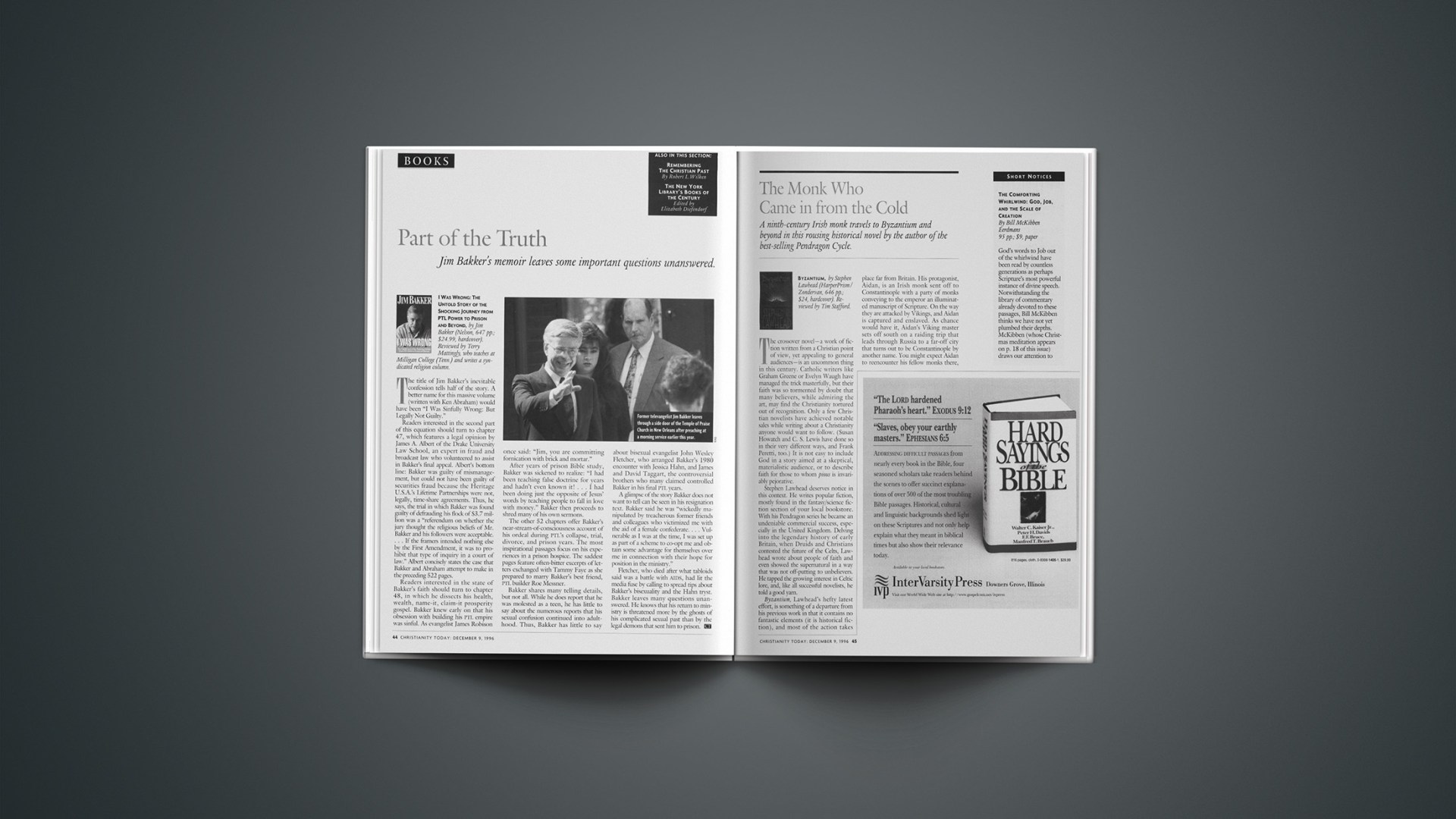I Was Wrong: The Untold Story of the Shocking Journey from PTL Power to Prison and Beyond,by Jim Bakker (Nelson, 647 pp.; $24.99, hardcover). Reviewed by Terry Mattingly, who teaches at Milligan College (Tenn.) and writes a syndicated religion column.
The title of Jim Bakker’s inevitable confession tells half of the story. A better name for this massive volume (written with Ken Abraham) would have been “I Was Sinfully Wrong: But Legally Not Guilty.”
Readers interested in the second part of this equation should turn to chapter 47, which features a legal opinion by James A. Albert of the Drake University Law School, an expert in fraud and broadcast law who volunteered to assist in Bakker’s final appeal. Albert’s bottom line: Bakker was guilty of mismanagement, but could not have been guilty of securities fraud because the Heritage U.S.A.’s Lifetime Partnerships were not, legally, time-share agreements. Thus, he says, the trial in which Bakker was found guilty of defrauding his flock of $3.7 million was a “referendum on whether the jury thought the religious beliefs of Mr. Bakker and his followers were acceptable . …If the framers intended nothing else by the First Amendment, it was to prohibit that type of inquiry in a court of law.” Albert concisely states the case that Bakker and Abraham attempt to make in the preceding 522 pages.
Readers interested in the state of Bakker’s faith should turn to chapter 48, in which he dissects his health, wealth, name-it, claim-it prosperity gospel. Bakker knew early on that his obsession with building his PTL empire was sinful. As evangelist James Robison once said: “Jim, you are committing fornication with brick and mortar.”
After years of prison Bible study, Bakker was sickened to realize: “I had been teaching false doctrine for years and hadn’t even known it! … I had been doing just the opposite of Jesus’ words by teaching people to fall in love with money.” Bakker then proceeds to shred many of his own sermons.
The other 52 chapters offer Bakker’s near-stream-of-consciousness account of his ordeal during PTL’s collapse, trial, divorce, and prison years. The most inspirational passages focus on his experiences in a prison hospice. The saddest pages feature often-bitter excerpts of letters exchanged with Tammy Faye as she prepared to marry Bakker’s best friend, PTL builder Roe Messner.
Bakker shares many telling details, but not all. While he does report that he was molested as a teen, he has little to say about the numerous reports that his sexual confusion continued into adulthood. Thus, Bakker has little to say about bisexual evangelist John Wesley Fletcher, who arranged Bakker’s 1980 encounter with Jessica Hahn, and James and David Taggart, the controversial brothers who many claimed controlled Bakker in his final PTL years.
A glimpse of the story Bakker does not want to tell can be seen in his resignation text. Bakker said he was “wickedly manipulated by treacherous former friends and colleagues who victimized me with the aid of a female confederate. … Vulnerable as I was at the time, I was set up as part of a scheme to co-opt me and obtain some advantage for themselves over me in connection with their hope for position in the ministry.”
Fletcher, who died after what tabloids said was a battle with AIDS, had lit the media fuse by calling to spread tips about Bakker’s bisexuality and the Hahn tryst. Bakker leaves many questions unanswered. He knows that his return to ministry is threatened more by the ghosts of his complicated sexual past than by the legal demons that sent him to prison.
Copyright © 1996 Christianity Today. Click for reprint information.










